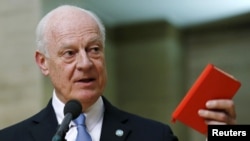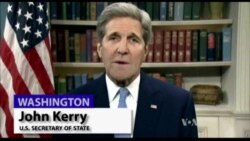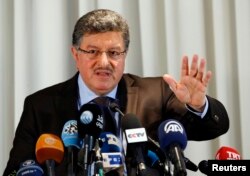After boycotting the start of indirect peace talks, representatives of the main Syrian opposition group met Sunday with the U.N. envoy for Syria, Staffan de Mistura, in Geneva, with both sides saying there had been progress in resolving some of the issues that had the opposition threatening to leave.
De Mistura told reporters he is “optimistic and determined” that the opposition will join the peace process that got underway Friday, five days behind schedule and with opposition representatives boycotting the first day.
A spokesman for the Syrian opposition said the discussions on Sunday were “encouraging and positive” concerning humanitarian issues, referring to the group’s demands for an end to airstrikes on civilians and the lifting of sieges that are preventing humanitarian aid from reaching rebel-held areas.
Earlier in the day, the group said it was in Geneva to meet with U.N. officials and not to enter into negotiations, even indirect ones, with the government of President Bashar al-Assad. Late Sunday, the opposition spokesman said his delegation will have another meeting with U.N. officials Monday.
The so-called proximity talks are meant to lay the groundwork for eventual direct negotiations.
With no face-to-face encounters scheduled between Assad government officials and opposition representatives in this round, the plan is for the U.N. envoy to consult with each side separately and shuttle between the two to relay proposals and positions.
US urges push
In Washington, U.S. Secretary of State John Kerry urged the Syrian government and the opposition to push for an end to the nearly 5-year-old conflict that has killed a quarter of a million people and displaced millions. He described the war in Syria as “an unfolding humanitarian catastrophe unmatched since World War II.”
WATCH: US Secretary of State John Kerry's statement
"I appeal to both sides to make the most of this moment, to seize the opportunity for serious negotiations, to negotiate in good faith with the goal of making concrete measurable progress in the days immediately ahead,'' Kerry said.
Representatives of the opposition group, the High Negotiations Committee, arrived in Geneva Saturday, saying they would engage only in talks with U.N. officials, but not negotiations.
The Saudi-backed group has been meeting in Riyadh and demanded a halt to airstrikes by Syrian government and Russian forces on civilians, and the lifting of sieges on rebel-held areas, before it would enter into negotiations.
Delegates decided to travel to Switzerland only after receiving assurances their demands would be heard. "We only came to Geneva after written commitments on the fact that there would be serious progress on humanitarian issues," HNC spokeswoman Basma Kodmani told reporters.
'Historic occasion'
After Friday’s shaky start, U.N. envoy Staffan de Mistura was determined to make this round succeed.
“It is an historic occasion not to be missed,” he said, as he left a Geneva hotel after meeting with the opposition. U.N. officials described the meeting as informal and hoped the HNC officials would agree to a formal meeting later Sunday.
The Islamic State extremist group was not invited to the Geneva peace talks because it, along with the al-Nusra Front, is designated by the United Nations as a terrorist organization.
Limited talks
The government of Syrian President Bashar al-Assad considers all rebel groups that want to depose Assad terrorists, but agreed to proximity talks with some opposition groups the international community recognizes as moderate.
On Sunday, a senior Syrian government official said Assad would never accept the inclusion of Ahrar al-Sham and the Army of Islam groups.
The statement presents a possible snag for the talks because many in the moderate opposition believe both groups should eventually be included, while the Syrian government and its Russian backers see them as extremists with whom Damascus should not negotiate.














